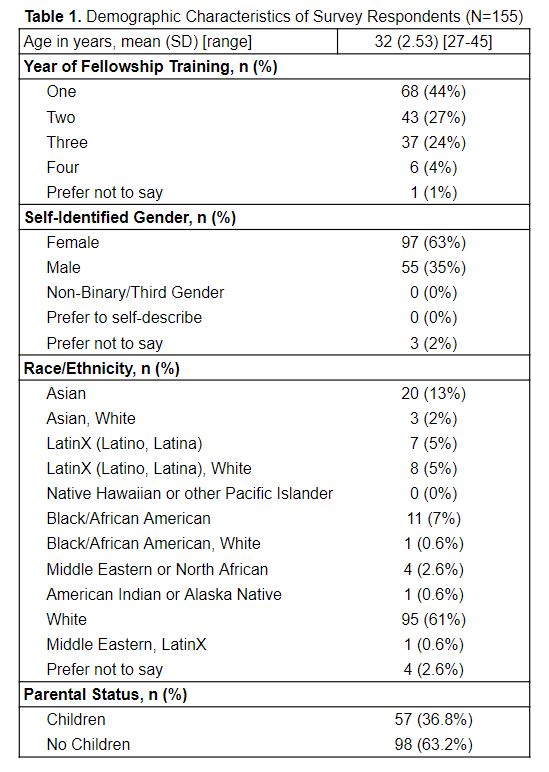Medical Education: Fellow
Medical Education 3: Fellow 1
484 - From Surviving to Thriving: Work Engagement Among Pediatric Sub-specialty Fellowship Trainees
Friday, April 28, 2023
5:15 PM - 7:15 PM ET
Poster Number: 484
Publication Number: 484.124
Publication Number: 484.124
Sarah Khan, Cincinnati Children's Hospital Medical Center, Cincinnati, OH, United States; Amanda Schondelmeyer, Cincinnati Children's Hospital Medical Center, Cincinnati, OH, United States; Benjamin Kinnear, Cincinnati Children's Hospital Medical Center, Cincinnati, OH, United States; Karen Jerardi, Cincinnati Children's Hospital Medical Center, Cincinnati, OH, United States
.jpg)
Sarah Khan, MD (she/her/hers)
Clinical Hospital Medicine Fellow
Cincinnati Children's Hospital Medical Center
Cincinnati, Ohio, United States
Presenting Author(s)
Background: Work engagement is characterized by a sense of fulfillment and commitment to one’s work. Engagement among healthcare workers is associated with decreased turnover and improved patient safety-related behavior. Physician trainees are a unique population of advanced learners with high levels of burnout; however, information about work engagement among pediatric fellows remains unexplored.
Objective: To assess levels of work engagement among pediatric sub-specialty fellowship trainees.
Design/Methods: We surveyed pediatric sub-specialty fellows at a large, freestanding children’s hospital using an electronically distributed questionnaire. We measured work engagement using the 9-item Utrecht Work Engagement Scale (UWES-9). The validated questionnaire includes 3 subsections: vigor, dedication, and absorption. Scores for overall engagement and their respective sub-scale scores were calculated. These scores were then categorized as “very low”, “low”, “average”, “high”, and “very high” per pre-established norms. We collected self-reported demographics on age, race, gender, and parental status. Demographic information was summarized using counts, percentages, mean and median as appropriate. Chi-square tests were run to test for relationships between gender, year of fellowship, parental status, and overall engagement scores.
Results: 155/280 (55%) fellows completed the survey (Table 1), with the highest response rates from first year fellows (n=68, 44%), followed by second (n=43, 27%), third (n=37, 24%), and fourth year fellows (n=6, 4%). Respondents had a mean age of 32 years, were predominantly female (n=107, 64%), and most identified as white (n=95, 61%). Overall, 6% of fellows reported very low or low engagement, 42% reported average engagement, and 52% reported high or very high engagement (Table 2). With regard to the specific subscales, fellows reported lower levels of vigor when compared to dedication and absorption. Gender, year of fellowship, and parental status were not associated with differences in work engagement (Table 3).
Conclusion(s): Assessing work engagement among trainees offers an opportunity to understand a facet of well-being beyond burnout. Variability exists in the levels of engagement experienced by pediatric sub-specialty fellows. This variability may be valuable to leverage a greater understanding of different drivers that lead to specific archetypes of engaged trainees, which can be utilized to strategically target and optimize trainee well-being. Next steps include identifying unique factors that promote or detract from work engagement among pediatric fellows.


.jpg)
